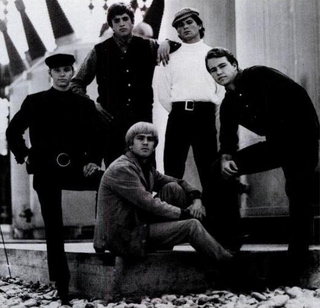
The Electric Prunes are an American psychedelic rock band, formed in Los Angeles, California, in 1965. Much of the band's music was, as music historian Richie Unterberger described it, possessed of "an eerie and sometimes anguished ambiance." Their most successful material was by songwriters Annette Tucker and Nancie Mantz, though the group also penned their own songs. Incorporating psychedelia and elements of embryonic electronic rock, the band's sound was marked by innovative recording techniques with fuzz-toned guitars and oscillating sound effects. In addition, guitarist Ken Williams' and singer James Lowe's concept of "free-form garage music" provided the band with a richer sonic palette and exploratory lyrical structure than many of their contemporaries.

The Shadows of Knight were an American rock band from Chicago, Illinois, that played a version of British blues influenced by their native city. When they began recording in 1965, the band's self-description was "the Stones, Animals and the Yardbirds took the Chicago blues and gave it an English interpretation. We've taken the English version of the Blues and re-added a Chicago touch," to which rock critic Richie Unterberger commented: "The Shadows of Knight's self-description was fairly accurate."

The Music Machine was an American rock band formed in Los Angeles, California in 1966. Fronted by chief songwriter and lead vocalist Sean Bonniwell, the band cultivated a characteristically dark and rebellious image reflected in an untamed musical approach. Sometimes it made use of distorted guitar lines and hallucinogenic organ parts, punctuated by Bonniwell's distinctively throaty vocals. Although they managed to attain national chart success only briefly with two singles, the Music Machine is today considered by many critics to be one of the groundbreaking acts of the 1960s. Their style is now recognized as a pioneering force in proto-punk; yet within a relatively short period of time, they began to employ more complex lyrical and instrumental arrangements that went beyond the typical garage band format.

"Misery" is a song by the English rock band the Beatles from their 1963 debut album Please Please Me. It was co-written by John Lennon and Paul McCartney. According to Lennon, "It was kind of a John song more than a Paul song, but it was written together." McCartney was to say: "I don't think either one of us dominated on that one, it was just a hacking job."

The Remains were a mid-1960s American garage rock group from Boston, Massachusetts, led by Barry Tashian. Although the Remains never achieved national success, they were very popular in New England, and were one of the opening acts on the Beatles' final US tour in 1966.

"Don't Look Back" was the Remains' last single on Epic Records. The song was composed by Billy Vera, who composed and recorded "Storybook Children" for Atlantic Records. "Don't Look Back" was released as Epic 10060 in 1966. Its B-side was "Me Right Now", composed by Barry Tashian, the Remains' leader.

The Place and the Time is a compilation album of demos, outtakes, alternative versions and live versions of songs by Moby Grape, released by Sundazed Records in 2009 in CD and double LP format.

Preflyte is a compilation album by the American folk rock band the Byrds and was released in July 1969 on Together Records. The album is a collection of demos recorded by the Byrds at World Pacific Studios in Los Angeles during late 1964, before the band had signed to Columbia Records and become famous. It includes early demo versions of the songs "Here Without You", "You Won't Have to Cry", "I Knew I'd Want You", and "Mr. Tambourine Man", all of which appeared in re-recorded form on the band's 1965 debut album.

San Fran Sessions is a box set compilation which collects 60 demos, outtakes, rarities and unissued performances recorded by The Beau Brummels from 1964 to 1966. The three-disc set, released by Sundazed Records on June 11, 1996, includes alternate takes of the band's singles "Laugh, Laugh" and "Just a Little", as well as early versions of songs that were likely targeted for their never-completed third album on Autumn Records.

Moby Grape Live is a 2010 album, released by Sundazed Records, of previously unissued live recordings of the band Moby Grape. Included are recordings of the band in its prime in 1966 and 1967, as well as 1969 recordings, subsequent to the 1968 collapse and departure of founding member Skip Spence. A particularly notable inclusion is the band's performance at the historic Monterey International Pop Festival. According to critic Mark Deming, "While Moby Grape's studio work might offer a clearer picture of the strength of their songs, Moby Grape Live does a brilliant job of revealing what made them great as a band, and the best tracks here should prompt any serious fan of late-'60s rock to reaffirm Moby Grape's status as one of the finest acts of their time." According to another reviewer, "After the essential debut record, this is the Moby Grape record I would recommend next."
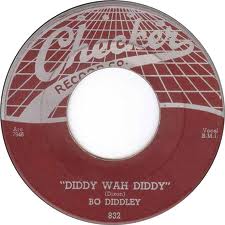
"Diddy Wah Diddy" is a song written by Willie Dixon and Ellas McDaniel, known as Bo Diddley, and recorded by the latter in 1956. The song shares only its title with Blind Blake's song "Diddie Wah Diddie" recorded in 1929. Over the years, the Bo Diddley song has been covered by many bands and artists, including the Astronauts, Captain Beefheart and his Magic Band, the Remains, the Twilights, Taj Mahal, the Sonics, the Fabulous Thunderbirds, Ty Segall Band, and the Blues Band among others.

Sugar and Spice is the 1966 debut album by The Cryan' Shames, originally released in mono and in stereo. The cover photography was done by Don Bronstein. The album was recorded in two days. The liner photography was done by Rich Dienethal of River Grove, Illinois. The cover photograph was taken at The Sweet Tooth in Pipers Alley, Old Town, Chicago. The album is dedicated to Fred Bohlander. The back of the album contains six photos of the band in concert. Apart from four songs written by The Cryan' Shames' lead guitarist Jim Fairs, the album consists entirely of cover songs.

Barry Tashian is an American rock and folk musician.
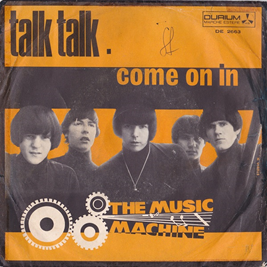
"Talk Talk" is the debut single of American garage rock band the Music Machine. It was released in November 1966, and produced the band's only Top 20 hit on the Billboard Hot 100. The song was included on their debut album, (Turn On) The Music Machine.

Distant Shores is the fifth studio album by the English duo Chad & Jeremy. It was released on 15 August 1966. Distant Shores was recorded between November 1965 and March 1966. This is the first album in which the duo were given time to craft their sound and style. This album is a precursor to their psychedelic album, Of Cabbages and Kings. It includes the first recording of Paul Simon's "Homeward Bound", predating even Simon & Garfunkel's record.
The Magicians were an American garage rock band formed in New York City, New York, in 1965. The group released four singles during their brief recording career with Columbia Records, with their most well-known song being "An Invitation to Cry". Members Alan Gordon and Garry Bonner later became a successful songwriting duo, and the Magicians' material was assembled on a compilation album in 1999.
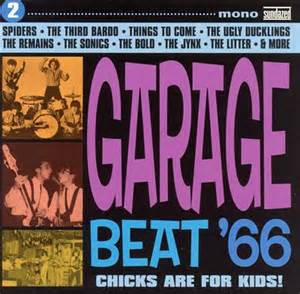
Garage Beat '66 Volume 2: Chicks are for Kids! is the second installment in the Garage Beat 66 series of garage rock compilations issued by Sundazed Records, which was released on April 27, 2004 and is available exclusively on compact disc. It features well-researched liner notes, written by Ugly Things publisher Mike Stax, which supply background information about each song and act, usually including photographs of the bands. Like all of the entries in the series it is noted for good sound quality, as all of the tracks are mastered from the original studio master sources.

No Chance Baby! is a retrospective album by the American garage rock band Oscar and the Majestics and was released on July 26, 2011 on Sundazed Records. The album compiles all of the group's released material that was previously available to only a handful of collectors.
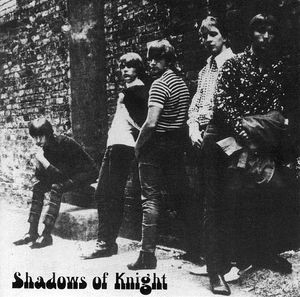
Raw 'n' Alive at the Cellar, Chicago 1966! is a live album by the American garage rock band the Shadows of Knight, and was released on Sundazed Records in 1992. The album consists of recordings from the band's appearance at the Cellar in Arlington Heights, Illinois in December 1966. Although the tapes were never anticipated to be released publicly, Raw 'n' Alive at the Cellar is commended for its good sound quality, and represents one of the better live concert recordings to emerge from the garage rock era.

Black Beauty is an album by the psychedelic rock band Love, released on February 13, 2012, nearly six years after the death of frontman Arthur Lee. Issued on High Moon Records, it compiles material from a canceled studio album, which Lee—backed by a new group with an all-black line-up—planned to have released on the Buffalo Records label. Recorded after a series of unsuccessful albums, both with Love and his 1972 solo effort Vindicator, Black Beauty was intended to serve as Lee's comeback album. Among other Love releases, it is notable for its reinvention of the band as a funk group, while preserving Lee's lyrical complexity.


















